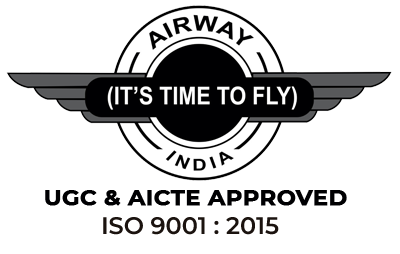
Acquiring theoretical knowledge is insufficient in today’s competitive job market to make an impression and land a fulfilling career. Real-world experience gained through internships and industry partnerships is essential for students aspiring to work in aviation. In order to improve students’ employability and practical skills, aviation management colleges are increasingly realizing this need and implementing workshops, internships, and industry exposure programs.
This blog discusses the advantages of internships and industry partnerships, how important they are in preparing students for careers in aviation, and how to pick an Aviation Management College that offers practical experience.
Why Aviation Education Needs Internships
The Value of Hands-on Training in Aviation Management
Because the aviation industry is so dynamic, professionals who can handle real-world challenges in addition to understanding theory are needed. Internships in aviation provide a controlled setting where students can apply what they have learned in the classroom to real-world work situations.
Students benefit from internships:
Gain technical proficiency by running flight management systems, following customer service guidelines, or organizing logistics.
Develop your soft skills, such as teamwork, communication, problem-solving, and flexibility.
Make connections with professionals in the field; doing so may lead to future job opportunities.
Gain confidence: Students who are familiar with the culture of the workplace are better equipped to handle responsibilities and face job interviews.
The Impact of Aviation Internships on Career Preparedness
Through internships in aviation, students can interact with a variety of departments, including customer service, cargo handling, airport management, and airline operations. An intern working in an airport operations team, for instance, might gain knowledge of flight scheduling, maintaining safety regulations, and controlling passenger flow.
Students benefit from these experiences:
Recognize aviation standard operating procedures.
Study up on legal frameworks such as the DGCA regulations.
Learn about crisis management and customer relations.
Participate in quality assurance and safety audits.
Recruiters highly value students who complete internships because they become industry-ready candidates with real-world problem-solving skills.
Available Aviation Internship Types
The majority of aviation management colleges provide a range of internship options, such as:
Internships with airlines: collaborating with operations, ground crew, and cabin crew.
Internships in cargo and logistics: gaining knowledge of freight forwarding, supply chain management, and documentation.
Internships in customer service: instruction in reservations, ticketing, and passenger support.
Internships in maintenance and safety provide knowledge of emergency response procedures, aircraft maintenance, and safety compliance.
Industry Collaborations: Filling the Knowledge and Job Gap.
The Aviation Sector’s Collaboration with Aviation Management Colleges
By forming alliances with airlines, airports, aviation consulting firms, and logistics companies, aviation management colleges establish robust industry networks. These partnerships make it easier to find internships, jobs, and specialized training.
Among the advantages of industry partnerships are:
Guaranteed internship spots: Throughout the course, students are guaranteed opportunities for hands-on learning.
Live projects: Students tackle challenges given to them by partner organizations in real time.
Workshops and seminars: Leaders in the industry are asked to share their knowledge and perspectives.
Campus recruitment drives: To choose interns and full-time staff, hiring managers come to the college.
Choosing the Right Aviation Management College with Strong Industry Links
Make sure an aviation management college offers the following when choosing one:
An organized internship program: Verify whether internships are incorporated into the course as a fundamental element.
Partnerships with leading aviation companies: Partnerships with airport authorities and airlines increase visibility.
Industry speakers and seasoned mentors: Gaining knowledge from experts enhances students’ understanding.
Placement support: Colleges with a specialized career development team help students find employment.
Students gain practical experience and a competitive edge by selecting an Aviation Management College with strong industry exposure.
Testimonials from Students Who Benefited from Internships
In addition to internships, a lot of aviation management colleges advise students to take part in:
Webinars and conferences: A chance to engage with experts from around the world.
Industry certifications: Training programs for aviation professionals such as IATA or ICAO certifications.
Volunteer programs include helping out at safety exercises, airshows, and customer service campaigns.
You can consult IATA’s official aviation training guide for additional information on aviation certifications and training programs.
Concluding remarks
Industry exposure and internships are crucial parts of aviation education, not optional extras. Students at aviation management colleges that place a high value on practical training are ready to take on the demands of a fast-paced, high-pressure industry. Students can develop a fulfilling career in aviation by selecting a college with well-organized internship programs and strong industry relationships.
Make sure to thoroughly examine an aviation management college’s internship programs and industry partnerships if you’re thinking about enrolling. Your path to a prosperous career in airline operations, airport administration, cargo handling, and other fields begins with a well-rounded education.
Why is choosing the right Aviation Management College important for my career?
Selecting the right Aviation Management College ensures you gain the practical training, internships, and industry exposure necessary to build a successful career in the aviation sector.
How do Aviation Colleges help with internships and industry exposure?
Aviation Colleges collaborate with airlines, airports, and logistics companies to provide structured internships, live projects, and industry workshops that enhance real-world learning.
What should I look for when selecting an Aviation Management College?
When choosing an Aviation Management College, it’s important to check if they offer certified internship programs, strong industry partnerships, career guidance, and experienced faculty.
Can Aviation Management Colleges provide placement assistance after graduation?
Yes, many Aviation Colleges offer placement support by organizing recruitment drives, career counseling, and networking opportunities with aviation professionals.
Are internships mandatory in Aviation Management College programs?
Most Management Colleges include internships as a core part of their curriculum, ensuring students get hands-on experience before entering the aviation workforce.
